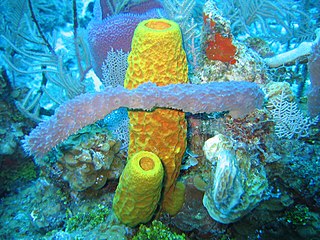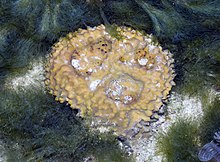
Demosponges (Demospongiae) are the most diverse class in the phylum Porifera. They include greater than 90% of all species of sponges with nearly 8,800 species worldwide. They are sponges with a soft body that covers a hard, often massive skeleton made of calcium carbonate, either aragonite or calcite. They are predominantly leuconoid in structure. Their "skeletons" are made of spicules consisting of fibers of the protein spongin, the mineral silica, or both. Where spicules of silica are present, they have a different shape from those in the otherwise similar glass sponges. Some species, in particular from the Antarctic, obtain the silica for spicule building from the ingestion of siliceous diatoms.
Ecionemia is a genus of sea sponges belonging to the family Ancorinidae.

Geodia is a genus of sea sponge belonging to the family Geodiidae. It is the type genus of its taxonomic family.

Astrophorina is a suborder of sea sponges in the class Demospongiae. Astrophorina was formerly named Astrophorida and classified as an order, but it is now recognised as a suborder of Tetractinellida

Geodiidae is a family of sea sponges.

Stelletta is a genus of sea sponges belonging to the family Ancorinidae.

Tethya is a genus of sea sponges belonging to the family Tethyidae. Members of this genus all have a spherical body form and some are known to be able to move at speeds of between 1 and 4 mm per day.

Ancorinidae is a family of marine sponges belonging to the order of Tetractinellida.

Pachymatisma is a genus of sponges belonging to the family Geodiidae.

Cinachyrella is a genus of marine sponges in the family Tetillidae.
Calthropella is a genus of sea sponges in the order Tetractinellida. It is the only genus in the monotypic family Calthropellidae.

Craniella is a genus of marine sponges in the family Tetillidae.
Geodia cooksoni is a sponge species in the family Geodiidae. The species was first described by British scientist William Johnson Sollas in 1888 under the name Cydonium cooksoni. It is found in the waters of the Pacific Ocean around the Galápagos Islands.

Discodermia is a genus of deep-water sea sponge.
Ciocalypta is a genus of sea sponges belonging to the family Halichondriidae.

Dysidea is a genus of sponges belonging to the family Dysideidae.

Theonellidae is a family of sponges belonging to the order Tetractinellida, which was first described by Robert von Lendenfeld in 1903.
Vulcanellidae is a family of sponges belonging to the order Tetractinellida.
Tetilla is a genus of demosponges in the family Tetillidae. It is widely distributed. They are mainly found in deeper habitats.










